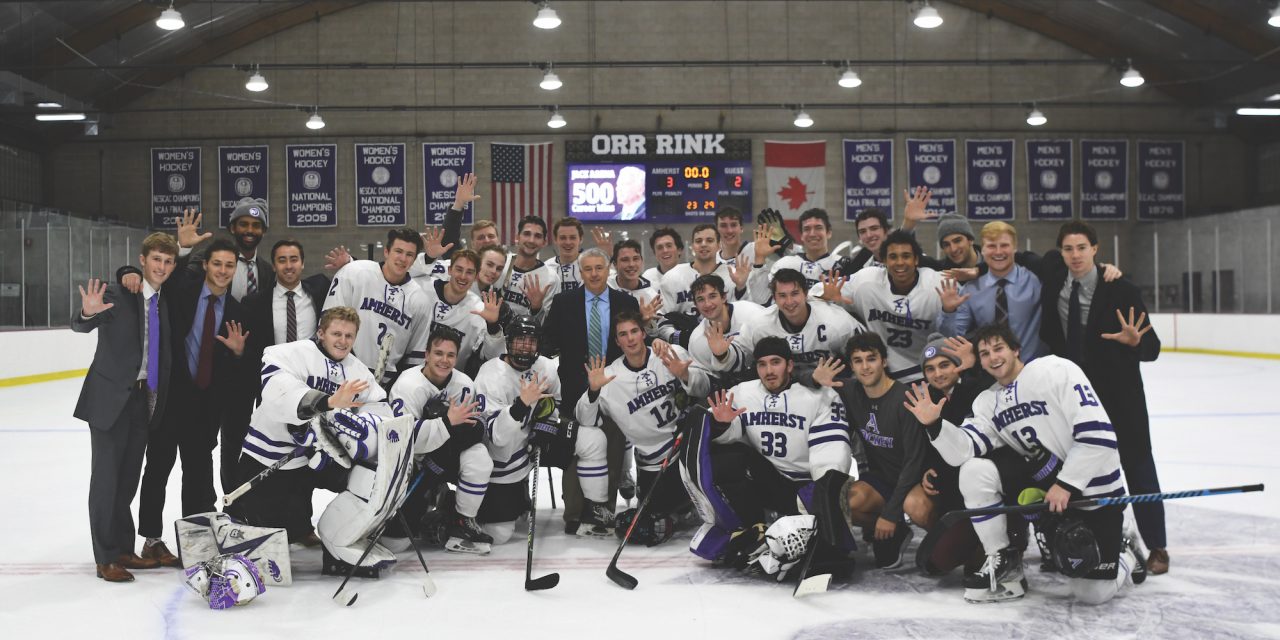
Amherst Coach Jack Arena ’79 Achieves 500th Win

Story by Bob York
It’s obvious the moment you step into Jack Arena’s ’79 office: Everything’s about his players.
A pair of Sid Watson Awards, honoring the two National Div. III Player of the Year recipients Arena has mentored during his 40 years as a hockey coach at Amherst College, immediately catch your eye. Then there are the nine plaques paying tribute to four players and five teams that were NCAA Div. III Statistical Champions during his reign. Behind his desk, eight other plaques serve as accolades for former players who earned All-American status.
“I’ve never been one to make a big deal of personal accomplishments,” says Arena, a former three-sport standout—football, hockey and baseball—for the Mustangs.
That, “despite my family’s dismay,” is why you won’t find even a hint of Arena’s personal successes in his office—unless you ask to see the evidence.
There’s no clue that Arena is one of the most successful men’s college hockey coaches ever. In fact, the closest indication that he notched his 500th coaching victory last December is an Amherst game jersey folded across the back of a chair with the number 400 on it, which was presented to him 100 wins prior. Those 500 victories make Arena the fourth winningest active Div. III coach in the country, and—counting Div. I programs—28th overall.
Two large glass vases on the floor near his desk are his two National Div. III Coach of the Year Awards (2012, 2015). Over on his bookcase, buried under other mementoes, is the 1983 Hobey Baker Award he received as the nation’s Outstanding Div. III Player following his senior sea- son at Amherst. On an adjoining shelf, amid more souvenirs, lie his two NESCAC Coach of the Year plaques (2009, 2012).
As for championships, the seven banners hanging from the Orr Rink rafters have those covered: two ECAC champion- ships (1992, 1996), three NESCAC titles (2009, 2012, 2015), and two NCAA Final Four appearances (2009, 2015). In total, during Arena’s tenure, 18 of 22 graduating classes have qualified for at least one NESCAC title game since the tourney began, in 2000.
Though it’s been nearly a half-century since Arena competed for the Mustangs, “I still remember the passion I had for hockey and baseball…and I enjoyed playing them equally,” he says.
He played them equally well, too. And although admitting the only highlight of his Milton career he really remembers “was scoring my 100th point in my final hockey game,” others remember Arena’s heroics. His senior year he earned All-Independent School League laurels in all three sports and was named to the Quincy Patriot-Ledger All-Scholastic Team in all three as well. Arena then capped his Milton career by winning the Saltonstall Medal as the school’s top athlete.
Winning the Hobey Baker Award not only celebrated a glorious past in which Arena scored 140 points during his Amherst career, but it also proved to be an omen for the future. Five months after winning the honor, his fairy tale continued by being named the Mammoths’ head coach.
“I originally received a fellowship to stay on as an assistant coach,” he explains. “Then, when the head coach left in the spring, I was asked to be interim head coach. As the season approached, however, the AD couldn’t find anyone he liked, so he asked me if I was interested in being the head coach.
“I said yes; 40 years later, I’m still here,” adds Arena, as a huge smile breaks across his face.
Bob York is a freelance sportswriter from Greenfield, Mass., whose work can be found in the New England Prep School Athletic Council Magazine.




